Are you a Quiet Speculation member?
If not, now is a perfect time to join up! Our powerful tools, breaking-news analysis, and exclusive Discord channel will make sure you stay up to date and ahead of the curve.
Not every tournament is going to go your way. Sometimes no matter how well prepared you are or how well you play you just can't win. That does not mean that the tournament is a failure as long as you utilize it well. Every game you play is an opportunity to learn something. Something about your deck, your play style, or more general Magic theory. Sometimes, players forget lessons they learned many years ago, or get the opportunity to learn something that they skipped over when learning the game. And sometimes you apply an already-learned lesson that you didn't remember you'd learned. This is one such lesson.
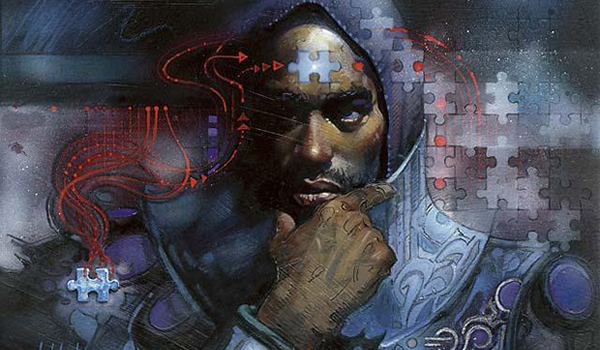
My GP Denver experience did not go well. As in, 4-4 drop not well. In actual matches played I went 2-4 (yea byes). I was playing a solid deck and was well prepared but things didn't go my way. In two of my losses, there was nothing I could have done. One was a very good matchup where I easily won game one, but in both sideboard games I had to mulligan to five and keep mediocre-at-best hands. The other one was an extremely bad matchup where I was unlikely to win if my opponent's hand was mediocre or better. It was in fact quite good both games.
However, my other two losses were winnable, if I had taken a slightly different line of play and/or had better variance than I actually did. This same line came up in a game I lost in a match I won, and what they came down to was a choice between a more flexible or a more rigid line. In all cases, based on my testing, experience, and read of the situation, I chose the more rigid line. At the time I made these plays, it was the correct line. However, had I gone with the more flexible lines I was far more likely to win based on how the game actually played out. I've been thinking about why I played the way I did and it's coming back to how I approach Modern and how I'm preparing for the RPTQ.
[wp_ad_camp_1]
The Starting Point
So why did I take the lines I did? I think it comes down to a bias in my testing prior to the 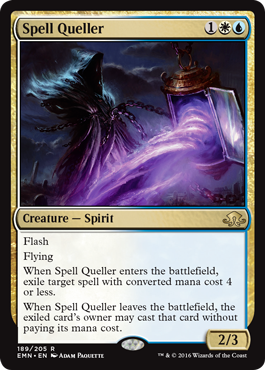 tournament. My testing had shown that certain lines were inherently more powerful than others. This led me to an understanding of my matchups based around these powerful lines, and I was prepared to counter them. This strategy had served me well in tournaments prior to the GP, but not at the GP itself. What it came down to was a combination of bad draws on my part, and the fact that my opponents were working out of a different rule book.
tournament. My testing had shown that certain lines were inherently more powerful than others. This led me to an understanding of my matchups based around these powerful lines, and I was prepared to counter them. This strategy had served me well in tournaments prior to the GP, but not at the GP itself. What it came down to was a combination of bad draws on my part, and the fact that my opponents were working out of a different rule book.
They were on different lines than I was used to and so when I took stock of the board state and considered what the opponent could have, I made my decision based on the plays I knew were powerful against me. The problem was that those were either not the lines that my opponents took, or the follow-up that made my line good did not happen. So what could I have done differently?
The Value of Flexibility
Had I taken more flexible lines in those games, I would have been in a better position to deal with what my opponents actually did rather than what I expected them to do. I may not have actually won those games or those matches, but I would have definitely had more of a chance than I actually did. A lot else went wrong for me that tournament, but I did not give myself the best chance to actually win those games because I stuck to a very rigid gameplan.
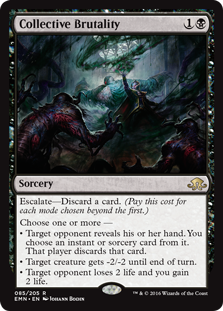 Flexibility is ultimately the reason that cantrips and card drawing is good. Why modal spells like Collected Brutality see play. It's why traditionally control decks were favored by the pros. They give you more options.
Flexibility is ultimately the reason that cantrips and card drawing is good. Why modal spells like Collected Brutality see play. It's why traditionally control decks were favored by the pros. They give you more options.
The more cards you see and the more decisions you are able to make, the better you are able to correctly respond to what your opponent is actually doing rather than trying to make do with the resources you have. Flexible lines are best when you lack perfect information on your opponent or their strategy, because you have some forgiveness built in. If the opponent is very limited in their options or is dancing to your tune, then yes, the inflexible line that scripts your plays is incredibly effective. The problem being it is far easier to disrupt a rigid plan than a flexible one.
Think of an ice column versus a rubber one. The ice is far stronger as long as it gets to do its thing, but hit it in the right place and it shatters. The rubber may not be as formidable, but it takes far more work to actually break the column. Flexibility lets you roll with the punches where rigidity will either shrug off the blows or shatter.
Had my opponent's gameplans lined up with my expectations I would have been fine. Because they did not I was out of position, fell behind and lost. Had I drawn better these mistakes may not have mattered, but as it stood they were the turning points. The were not mistakes at the time I made them, but the way the game played out they proved to be. Locking myself into a certain line with no margin of error caused a worse outcome than had I given myself more options. This is the lesson: Flexibility in the face of uncertainty is more valuable than raw power.
Modern's Weird
The thing is, I know I've learned and even taught that lesson about keeping your options as open as possible before. So why didn't I apply it here? The best explanation I've come up with at the time of writing is that I was applying Modern lessons to Standard and it didn't work. Now, obviously the lessons from one format aren't going to perfectly translate to another. It's why I've been writing the Beginner's Guide. In this case, I think the problem was that I was taking a Modern-style line in Standard and got punished.
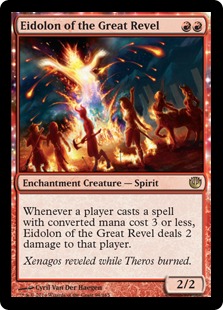 What do I mean? I've found through experience that Modern games, even sideboard games, are relatively predictable. Not as in actually predicting plays or who would win, but in terms of the lines you see. In Modern, the power level demands that each deck be as efficient as possible. This limits the effective card pool and subsequently limits the variation that is possible between decklists. If you're facing a Burn list the only real difference between maindeck configurations will be whether or not they have Wild Nacatl and small differences between numbers—not the actual deck composition.
What do I mean? I've found through experience that Modern games, even sideboard games, are relatively predictable. Not as in actually predicting plays or who would win, but in terms of the lines you see. In Modern, the power level demands that each deck be as efficient as possible. This limits the effective card pool and subsequently limits the variation that is possible between decklists. If you're facing a Burn list the only real difference between maindeck configurations will be whether or not they have Wild Nacatl and small differences between numbers—not the actual deck composition.
Consequently, you can guess the cards in an opponent's deck with reasonable accuracy. This lets you infer their available lines with decent accuracy. It also means that you can reasonably guess what cards will be sideboarded against you and how they will change the overall matchup. The available sideboard cards that are effective against your deck are somewhat limited, so a reasonably experienced player should know what to expect and prepare accordingly.
That isn't possible in Standard. Wizards deliberately weakening sideboard cards and the limited card pool has paradoxically caused far more variation in sideboards. I've mentioned this before, but in Standard it is far more important to determine the ideal configuration of your deck in a given matchup rather than play the right hate or answers. This allows for variation based on how players perceive the matchup. Subsequently, trying to guess an opponent's actual line is far more difficult. Therefore, Modern rewards more rigid lines and punishes flexibility while Standard favors flexibility. Legacy also tends to favor more flexible gameplay due to the cantrips and more powerful answers.
The Catch
Or rather, I should say that Modern games make taking rigid lines more profitable. If you know what your opponent's options are, even without knowledge of their hand, you can position yourself to mitigate or counter them. Which again, paradoxically, means that if you juke with off-the-wall deck building or sideboarding you can catch your opponent completely off guard and score free wins. Yes, I realize that it all sounds contradictory, but let me explain. Standard requires you to build a 75-card deck using The Elephant method. This creates rigidity in terms of deckbuilding since you are locked into a given sideboard strategy. The relatively low diversity makes this possible and gives advantages for doing so. However, the relatively low card power and speed makes flexibility in game play more viable and rewarding.
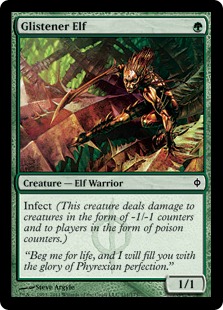 Due to higher card power and speed, Modern demands more rigid game plans and play. There's only so much you can do in the face of Infect. However, its vast card pool allows greater opportunities to surprise the opponent and to reposition yourself, making flexibility in your sideboard easier. Furthermore, the diversity demands more flexibility. You cannot have specialized plans for every deck, but instead must play cards that have game in a lot of matchups. The places where you can be flexible are reversed.
Due to higher card power and speed, Modern demands more rigid game plans and play. There's only so much you can do in the face of Infect. However, its vast card pool allows greater opportunities to surprise the opponent and to reposition yourself, making flexibility in your sideboard easier. Furthermore, the diversity demands more flexibility. You cannot have specialized plans for every deck, but instead must play cards that have game in a lot of matchups. The places where you can be flexible are reversed.
What this meant for me is that I applied a Modern mindset to my Standard games. Making the percentage-based "right" choice in Modern is correct since you have a higher likelihood of actually guessing the opponent's line, but in Standard you're better off with "worse" but more widely useful plays. You're giving up some percentage against the perceived play in order to hedge against higher play variance.
Application
So what does this mean for me for the RPTQ? I will need to focus on ensuring that my sideboard has the right mix of the right hate cards and general answers to deal with the unknown metagame I'm likely to face. It also means that as I type I'm giving very hard looks at my prospective sideboard and asking if I'm being too specialized. You can see anything at a Modern tournament and you need to maximize the game you have against the totality of the format, accounting for how aggressive the format is.
Simultaneously, I need to use my testing to identify the optimal lines of play. Since Modern rewards executing your own game plan as cleanly as possible, you can determine what your opponent's plan is relatively easily and either play around it or disrupt it, assuming you correctly recognize it first. I need to be trying to build a mental index of plays from a given boardstate and turn. This will give me the best chance to make optimal plays and play around my opponent's answers. How well will it work? I'll let you know next week.





Modern decks ARE very predictable, which is why you can find overall patterns within each deck to be exploited if you use the right statistical tools.
I completely agree with this article. In fact, one of the reasons I favor Mardu Burn over Naya Burn is due to the unpredictability aspect of it. With so many people knowing the “correct” configuration of Burn, and therefore how to play against it, the trading of one of the support colors for another can really throw people for loops especially in sideboard games. At the same time, the core of Burn remains so similar that the impact on the optimization of the deck is minimal at best. Is it the objectively best configuration? While I personally am not sold yet that it isn’t, most people would agree that it’s not. But taking into account human error on the opponent’s part and more importantly the rigid nature of Modern as a whole, it adds another difficult-to-quantify weapon to your deck: strategic chaos, by which I mean lack of order. Fitting, for a red deck!